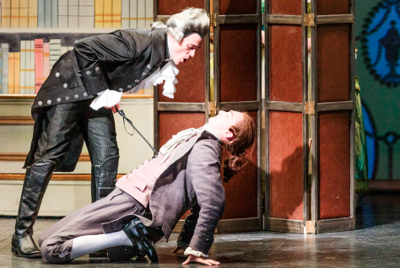How about a sparkling show featuring historical figures and events, characters from famous operas, music by a prominent contemporary composer, and a wonderful cast, plus loads of fun? The Glimmerglass Festival is mounting the virtually-unknown modern opera “The Ghosts of Versailles,” with music by John Corigliano and libretto by William M. Hoffman. In two acts and sung in English and French with English projected text, the opera is conducted by Glimmerglass music director Joseph Colaneri and directed by Jay Lesenger from the Chautauqua Opera Company. It is a co-production with Château de Versailles Spectacles.
The Metropolitan Opera commissioned “The Ghosts of Versailles” in 1980 to celebrate its 100th anniversary. The premiere came in 1991 and a revival in the 1994–95 season. Corigliano called it a “grand opera buffa”: a major work with large musical resources, but including comedy. It was indeed a grand—and costly—affair. Soon, orchestra, choruses and cast were cut down in size and a smaller version has been performed ever since. The Glimmerglass presentation has a cast of about 32 players and ghosts plus small chorus. All the soloists, except for Ukrainian-born soprano and 2016 Met Opera National Council auditions winner Yelena Dyachek, are from the company’s Young Artists program. The orchestra numbers about 40, according to Colaneri, with “lots of percussion.”
The plot, far too complicated to explain here, revolves around the ghost of the 18th-century French playwright Beaumarchais, author of three works about the barber Figaro (two serving as librettos for famous operas by Rossini and Mozart), attempting to cheer up the ghost of Marie Antoinette, who laments her undeserved death by staging an opera of the third play “La mère coupable” using the same characters, now much older. Much is comical, especially dueling between ghosts, a great deal is poignant and dramatic, as the French Revolution is also in the mix. It is quite a scene.
The production is dazzling, a treat for both eyes and ears. The minimal set depends on layers of gently moving blue and gray sheer curtains, some faintly painted with portraits. They part at times to show a cut-out interior scene with a ladder, the harem scene, or the scaffold (all opera references). The costumes are beautiful—the ghosts in ethereal white, Beaumarchais and his characters in traditional 18th-century dress, the harem scene dancers and the singer Samira in gaudy colors. The music provides an enormous sound world on three levels—the ghostly and otherworldly, the staged traditional opera, the mortal and historical. It is richly varied, and truly unreal at times. In the opening scene the stage is dark, the sound comes from nowhere and grows (another opera reference). The battery of percussion provides unorthodox sounds—the aria by the villain Bégearss referring to the aristocracy as rats is accompanied by squeaking and scurrying noises. There are pastiches of well-known arias, most noticeably when Figaro introduces himself with a patter song clearly related to his appearance in “The Barber of Seville” while the Countess and Susanna sing an imitation of their letter duet in “The Marriage of Figaro,” with accompaniment imitating the beautiful trio from “Così fan tutte.” It’s a feast for opera connoisseurs. There are quotations from Richard Strauss and a clear reference to the final scene of the Poulenc’s “Dialogues of the Carmelites.”We have poignant farewells, and an exquisite, outrageously funny harem scene with the singer Samira, yet another Mozart opera reference. Corigliano has had a wonderful time.
The singers performed and acted very well as usual. Dyachek as Marie Antoinette was outstanding—dramatic, full voiced, and profoundly lamenting. Baritones Jonathan Bryan playing Beaumarchais and Ben Schaefer as Figaro were admirable. Brian Wallin performing Count Almaviva, however, needed more heft and authority on stage.
Musically, this opera is very successful. Alas, the same cannot be said for the plot, which at times is simply bewildering. Just too many events are not resolved or explained: the letter in the jewelry box, the unexplained absence of the young lover Léon, the role of Bégearss in the family dynamic. The whole story of Léon and Florestine is not clear and might be eliminated altogether. The horrible death of Marie Antoinette could be more effectively shown just once, perhaps making the final scene more gentle. We already know from the start that she is a ghost.
But all said and done, the music saves the day, and this production shines with wonderful singing, beautiful staging, and lots of good spirits. For dates and tickets, consult Glimmerglass.org.






(0) comments
Welcome to the discussion.
Log In
This is a space for civil feedback and conversation. A few guidelines: 1. be kind and courteous. 2. no hate speech or bullying. 3. no promotions or spam. If necessary, we will ban members who do not abide by these standards.